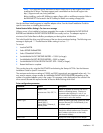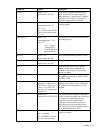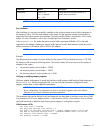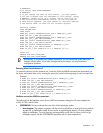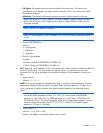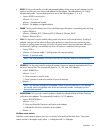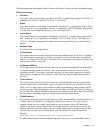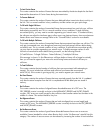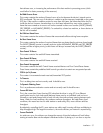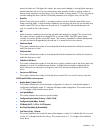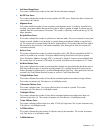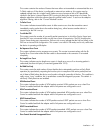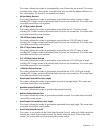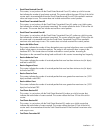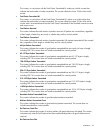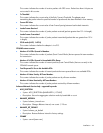Installation 37
that software uses, or increasing the performance of the host machine's processing power (which
would allow for faster processing of the resources).
• Rx DMA Overrun Errors
This counter contains the number of frames known to be lost because the device's internal receive
FIFO overflowed. This can occur if the device is unable to get the necessary bandwidth on the system
(PCI) bus. If the overflow condition persists for more than one frame, the frames that follow the first
could also be lost. However, because there is no lost frame indicator they may not be counted. A
frame that was counted as an overrun will not be counted in other error counters (SHORT_FRAMES,
CRC_ERRORS, or ALIGNMENT_ERRORS). To combat this, a faster bus machine, or fewer devices on
the bus will be needed.
• Rx Collisions Detect Errors
This counter contains the number of frames that encountered collisions during frame reception.
• Rx Short Frame Errors
This counter contains the number of received frames that are shorter than the minimum frame length.
The SHORT_FRAMES counter is mutually exclusive to the ALIGNMENT_ERRORS and CRC_ERRORS
counters and has a higher priority (a short frame will always increment only the SHORT_FRAMES
counter).
• Flow Control TX Pause
This counter contains Xon and Xoff frames transmitted.
• Flow Control RX Pause
This counter contains Xon and Xoff frames received.
• Flow Control Unsupported
This counter contains the MAC Control frames received that are not Flow Control Pause frames.
These frames contain the predefined MAX control type value but contain an unsupported opcode.
• TCO Rx (or Tx) Frames
This counter is incremented at each received/transmitted TCO packet.
• Tx Timeouts
This is a debug timer and not currently used. It should be zero.
• Tx Dynamic Chaining Count
This is a performance evaluation counter and not currently used. It should be zero.
• Current IFS Value
This is the current Inter Frame Spacing (IFS) value that the driver is using. IFS is an Ethernet
specification term for clock time spaces between frames sent by an individual card in a burst.
Normally a card sends frames back to back with only the minimum frame spacing between each
frame. Under low load conditions, this produces maximum throughput. But under heavy load
conditions, this means less time for other stations to send safely; thus, more collisions and less
throughput.
By adaptively controlling the IFS, more stations can safely send, lowering collisions and helping to
keep throughput high. The larger this number is, the more collisions your network is experiencing.
• Current Threshold
As under-runs occur, the software can change the amount of time the hardware will wait before
starting to transfer data onto the adapter's hardware buffers. By doing so, it can slow or stop the



